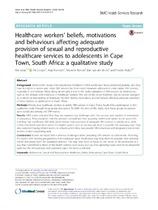| dc.contributor.author | Jonas, Kim | |
| dc.contributor.author | Crutzen, Rik | |
| dc.contributor.author | Krumeich, Anja | |
| dc.contributor.author | Roman, Nicolette V. | |
| dc.contributor.author | van den Borne, Bart | |
| dc.contributor.author | Reddy, Priscilla | |
| dc.date.accessioned | 2018-02-22T08:51:55Z | |
| dc.date.available | 2018-02-22T08:51:55Z | |
| dc.date.issued | 2018 | |
| dc.identifier.citation | Jonas, K. et al. (2018). Healthcare workers’ beliefs, motivations and behaviours affecting adequate provision of sexual and reproductive healthcare services to adolescents in Cape Town, South Africa: a qualitative study. BMC Health Services, 18: 109 | en_US |
| dc.identifier.issn | 1472-6963 | |
| dc.identifier.uri | http://dx.doi.org/10.1186/s12913-018-2917-0 | |
| dc.identifier.uri | http://hdl.handle.net/10566/3522 | |
| dc.description.abstract | BACKGROUND: Adolescents’ sexual and reproductive healthcare (SRH) needs have been prioritized globally, and they
have the rights to access and utilize SRH services for their needs. However, adolescents under-utilize SRH services,
especially in sub-Saharan Africa. Many factors play a role in the under-utilization of SRH services by adolescents,
such as the attitude and behaviour of healthcare workers. The aim of this study therefore, was to explore and gain
an in-depth understanding of healthcare workers’ beliefs, motivations and behaviours affecting adequate provision
of these services to adolescents in South Africa.
METHODS: Twenty-four healthcare workers in public SRH services in Cape Town, South Africa participated in this
qualitative study through focus group discussions. To fulfill the aims of this study, nine focus group discussions
were conducted among the SRH nurses.
RESULTS: SRH nurses indicated that they are experiencing challenges with the concept and practice of termination
of pregnancy. They explained that this practice contradicted their opposing beliefs and values. Some nurses felt
that they had insufficient SRH skills, which hinder their provision of adequate SRH services to adolescents, while
others described constraints within the health system such as not enough time to provide the necessary care. They
also explained having limited access to schools where they can provide SRH education and pregnancy prevention
services in the surrounding area.
CONCLUSIONS: Nurses are faced with numerous challenges when providing SRH services to adolescents. Providing
the nurses with training programmes that emphasize value clarification may help them to separate their personal
beliefs and norms from the workplace practice. This may help them to focus on the needs of the adolescent in a
way that is beneficial to them. At the health systems level, issues such as clinic operating hours need to be structured
such that the time pressure and constraints upon the nurse is relieved. | en_US |
| dc.language.iso | en | en_US |
| dc.publisher | BioMed Central | en_US |
| dc.rights | © The Author(s). 2018 Open Access This article is distributed under the terms of the Creative Commons Attribution 4.0
International License (http://creativecommons.org/licenses/by/4.0/), which permits unrestricted use, distribution, and
reproduction in any medium, provided you give appropriate credit to the original author(s) and the source, provide a link to
the Creative Commons license, and indicate if changes were made. The Creative Commons Public Domain Dedication waiver
(http://creativecommons.org/publicdomain/zero/1.0/) applies to the data made available in this article, unless otherwise stated. | |
| dc.subject | Adolescents | en_US |
| dc.subject | Sexual and Reproductive Healthcare | en_US |
| dc.subject | Beliefs | en_US |
| dc.subject | Motivations | en_US |
| dc.subject | Cape Town | en_US |
| dc.subject | South Africa | en_US |
| dc.title | Healthcare workers’ beliefs, motivations and behaviours affecting adequate provision of sexual and reproductive healthcare services to adolescents in Cape Town, South Africa: a qualitative study | en_US |
| dc.type | Article | en_US |
| dc.privacy.showsubmitter | FALSE | |
| dc.status.ispeerreviewed | TRUE | |

